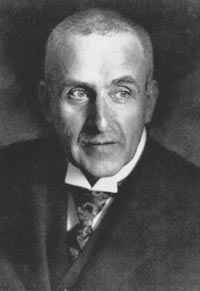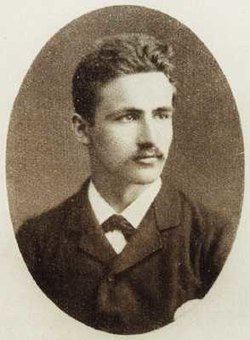Frank Wedekind
Frank Wedekind | |
|---|---|
 | |
| Born | Benjamin Franklin Wedekind July 24, 1864 |
| Died | March 9, 1918 (aged 53) |
| Occupation | Playwright |
| Relatives | Erika Wedekind (sister) Douglas Adams (great-grandson) |
| Family | Wedekind zur Horst |
| Signature | |

Benjamin Franklin Wedekind (July 24, 1864 – March 9, 1918) was a German
In the English-speaking world, before 2006 Wedekind was best known for the "Lulu" cycle, a two-play series—Erdgeist (Earth Spirit, 1895) and Die Büchse der Pandora (Pandora's Box, 1904)—centered on a young dancer/adventuress of mysterious origin. In 2006 his earlier play Frühlings Erwachen (Spring Awakening, 1891) became well known because of a Broadway musical adaptation.
Life and career
Benjamin Franklin Wedekind was born on July 24, 1864, in Hanover, German Confederation, Große Aegidienstraße 13 (today: Friedrichswall 10). His mother was Swiss and became pregnant with him in San Francisco. His father, a German, had a Swiss castle in which Wedekind grew up, after the family had left Hanover in 1872. Until World War I, when he was forced to obtain a German passport, he was an American citizen and traveled throughout Europe.[2] He lived most of his adult life in Munich, though he had a brief period working in advertising, for the Maggi soup firm, in Switzerland in 1886.[3]

Having worked in business and the circus, Wedekind went on to become an actor and singer. In this capacity, he received wide acclaim as the principal star of the
His sex life was promiscuous and he frequented prostitutes, contracting syphilis. He also enjoyed the pleasure of platonic female company and kept his tendencies toward homosexuality and sadism in check.[2] He had an affair with Frida Uhl, the wife of playwright August Strindberg, who bore him a child, the Swedish-Austrian journalist and author Friedrich Strindberg.[7] In 1906, he married the Austrian actress Tilly Newes, 22 years his junior and became strictly monogamous. His relationship with his wife was turbulent: Wedekind was prone to jealousy and felt pressure to maintain strenuous creative and sexual activity in order to please her. They had two daughters, Pamela and Kadidja,[8] but his jealousy led his wife to attempt both separation and suicide.[2]
Near the end of his life, Wedekind underwent an appendectomy and immediately began acting again, leading to a hernia. His doctor refused to operate immediately, but Wedekind insisted; and complications from the surgery led to his death at the age of 53 on March 9, 1918.[2]
Tilly Wedekind went on to appear in such films as
Wedekind's great-grandson was the English writer Douglas Adams.[10]
Works
Wedekind's first major play, .
The "Lulu" plays
Der Kammersänger ("The Court-Singer", 1899) is a one-act character study of a famous opera singer who receives a series of unwelcome guests at his hotel suite.
In Franziska (1910), the title character, a young girl, initiates a Faustian pact with the Devil, selling her soul for the knowledge of what it is like to live life as a man (reasoning that men seem to have all the advantages).
A number of Wedekind's works have been translated into English by Samuel Atkins Eliot Jr.
List of major works
- Frühlings Erwachen (The Awakening of the Spring, 1891)
- Erdgeist (Earth Spirit, 1895)
- Die Kammersänger (The Court-Singer or The Tenorist, 1899) [one-act play]
- Der Marquis von Keith (The Marquis of Keith, 1901)
- Mine-Haha, or On the Bodily Education of Young Girls (1903) [novella]
- König Nicolo oder So ist das Leben (King Nicolo, or Such is Life, 1902)
- Die Büchse der Pandora (Pandora's Box, 1904)
- Hidalla oder Sein und Haben (Hidalla, or Being and Having, 1905)
- Totentanz (The Dance of Death, 1905); later title 'Tod und Teufel' (Death and Devil)
- Musik (Music, 1906)
- Schloss Wetterstein (Castle Wetterstein, 1910)
- Franziska (1912)
- Bismarck (1916)
- Herakles (Heracles, 1917)
Adaptations
The "Lulu" plays formed the basis for
Hidalla was used as a source for a libretto by Franz Schreker, intended to be set by Alexander von Zemlinsky, but later set by Schreker himself in 1915 as the opera Die Gezeichneten.[17]
Der Kammersänger was adapted by composer Hugo Weisgall for his English-language opera The Tenor.
Wedekind's
In 2006, Frühlings Erwachen was adapted into the successful Broadway musical Spring Awakening.
References
Notes
- ^ See Banham (1998) and Willett (1959). In his Messingkauf Dialogues, Brecht cites Wedekind, along with Büchner and Valentin, as his "chief influences" in his early years: "he", Brecht writes of himself in the third person, "also saw the writer Wedekind performing his own works in a style which he had developed in cabaret. Wedekind had worked as a ballad singer; he accompanied himself on the lute." (1965, 69).
- ^ a b c d Simon, John (1990-11-18). "How Sex Killed Frank Wedekind". The New York Times. Retrieved 2014-08-11.
- ^ Willett (1959, 98n).
- ^ See Banham (1998) and Willett (1959, 87)
- ^ Willett (1959, 87).
- ^ Willett (1959, 87, 106).
- ^ Meyer, Michael. Strindberg: A Biography, Oxford: Oxford University Press, 1987, p. 363.
- ^ a b "Tilly Wedekind". IMDb.
- ^ "DER SPIEGEL 47/1969 - Ehe und Atlas". Spiegel.de. 1969-11-17. Retrieved 2014-08-11.
- ^ M. J. Simpson (2004), Hitchhiker: A Biography of Douglas Adams, Justin, Charles & Co., p. 7.
- ^ Mueller, Carl R. (2000). "Introduction". Frank Wedekind: Four Major Plays. Vol. 1. Lyme, NH: Smith and Krauss.
- ^ Willett (1959, 73n).
- ^ Bru, Sascha; Martens, Gunther (2006). The invention of politics in the European avant-garde (1906–1940). pp. 52–3.
- ^ Harewood, Earl of. The Definitive Kobbe's Opera Book, New York: Putnam, 1987. p.875
- ^ Roberson, John Linton. "Lulu"
- ^ "Lou Reed & Metallica - Lulu". Loureedmetallica.com. Retrieved 2014-08-11.
- ^ "Les Stigmatisés: Festival Les Jard". Opera-Lyon. Archived from the original on 26 February 2017. Retrieved 3 July 2017.
Bibliography
- Banham, Martin, ed. 1998. "Wedekind, Frank". In The Cambridge Guide to Theatre. Cambridge: Cambridge University Press. ISBN 0-521-43437-8. p. 1189-1190.
- Boa, Elizabeth. 1987. The Sexual Circus: Wedekind's Theatre of Subversion. Oxford and New York: Basil Blackwell. ISBN 0-631-14234-7.
- ISBN 0-413-38890-5.
- Mueller, Carl R. 2000. Introduction to Frank Wedekind: Four Major Plays, Vol 1. Lyme, New Hampshire: Smith and Kraus.
- Willett, John. 1967. The Theatre of Bertolt Brecht: A Study from Eight Aspects. Third rev. ed. London: Methuen, 1977. ISBN 0-413-34360-X.
External links
 Media related to Frank Wedekind at Wikimedia Commons
Media related to Frank Wedekind at Wikimedia Commons- Works by Frank Wedekind at Project Gutenberg
- Works by or about Frank Wedekind at the Internet Archive
- Works by Frank Wedekind at LibriVox (public domain audiobooks)

